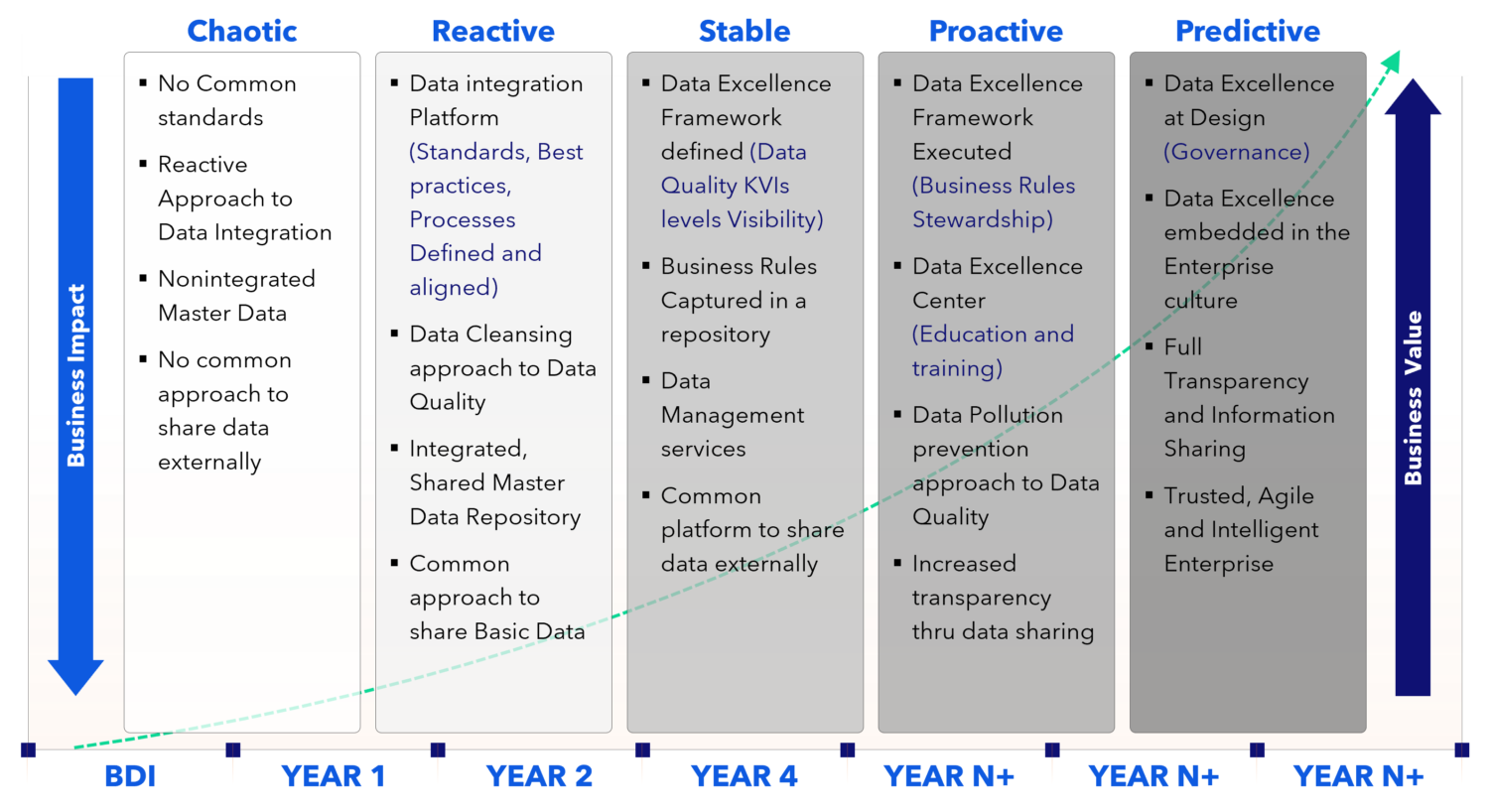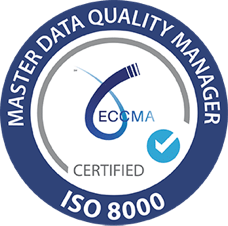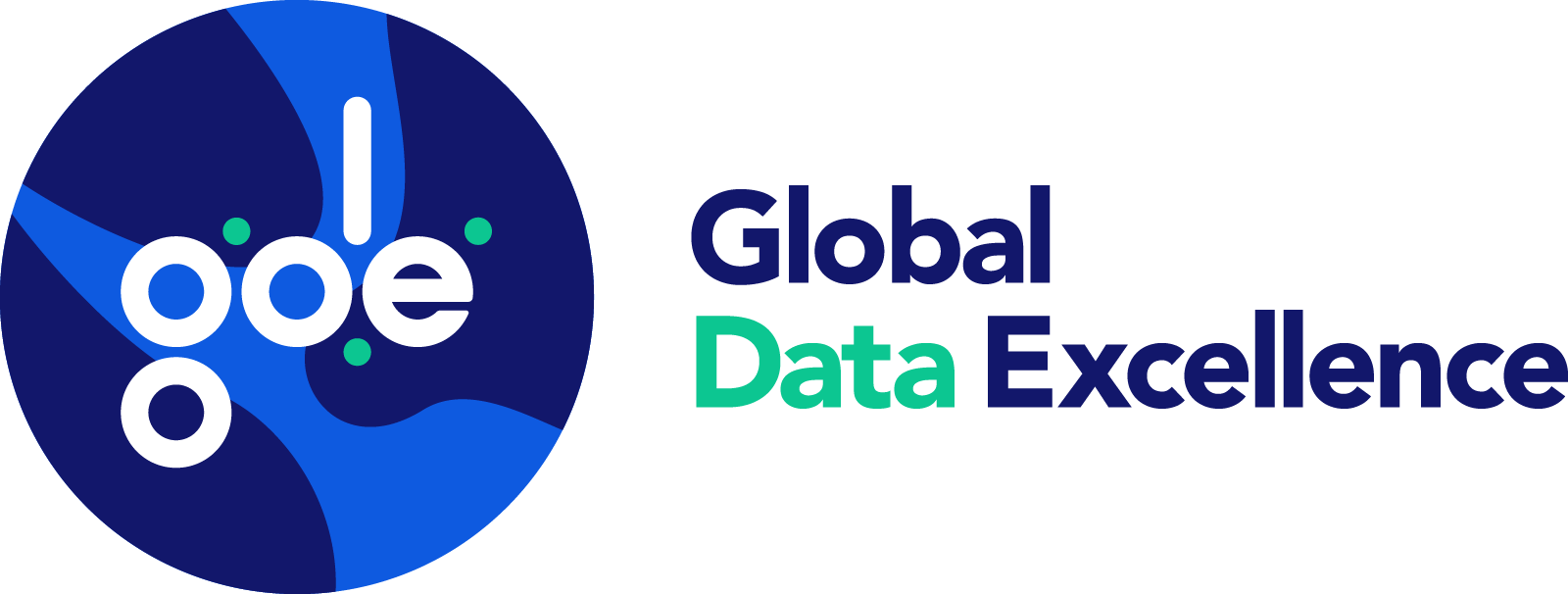
Every organization generates data but not every organization can lay claim to managing that data effectively. Different growth rates, different corporate histories, and different data cultures make for different stages of maturity when it comes to managing data. Governance challenges abound where data maturity is low but where these challenges can be overcome there is a real opportunity for organizations to generate enormous value.
But where does your organization stand in terms of data maturity? And how compliant are you and your teams with data excellence best practices? To answer these questions, you need a benchmark by which to measure your current stage of maturity and understand where the future of your data excellence lies.
At Global Data Excellence we have developed a Data Excellence Maturity Model, or DEMM. The DEMM clearly outlines the five different stages of data maturity and the elements common to organizations that have reached each stage. Over time and as data excellence evolves and improves, the level of business risk diminishes and the value that is generated from the data increases.
In this article we explain the basics of the DEMM and how it can be used to aid in understanding the right projects and initiatives that can be introduced at any stage to improve data excellence in an organization.

The Data Excellence Maturity Model (above) is a standard approach to assessing the maturity of an organization in terms of their data governance practices and approach to data excellence as a discipline. It consists of five stages, each with typical practices that differentiate that stage from the next.
As organizations move from the first stage, Chaotic, through Reactive, Stable, and Proactive to the fifth stage, Predictive, the level of risk that the organization is exposed to diminishes significantly. At the same time, the capacity for the organization to generate and realize value grows.
While data immature organizations cannot expect to reach the Predictive stage in weeks or months, the voyage from Chaotic data practices to Predictive data governance is thoroughly worthwhile and likely to transform a business and its decision-making practices. Enhanced decision intelligence will lead to better outcomes for the business and improve the chances of reaching the key value indicators (KVIs) that the business has established as targets.
DEMM Stage 1: Chaotic
When data governance is chaotic and best practices are not in place any data-based decision making is almost certainly sub-optimal. Organizations that maintain chaotic data excellence practices are at greatest risk and their capacity to generate value is low.
In these organizations there are no common standards for data governance, and practices vary across departments, divisions, and regions. There is a generally reactive approach to data integration with efforts to combine or integrate data only expended when decision makers feel there is no other option. What’s more, there is no common approach across the organization when it comes to sharing data externally. These inconsistencies between different parts of the business make for inefficiencies and low productivity, with little opportunity to make the sorts of decisions that generate lasting value for the organization.
DEMM Stage 2: Reactive
The reactive stage of data excellence maturity involves taking some first steps towards best practice data governance. While the organization is certainly less chaotic and data practices are more consistent, there is still plenty of room to improve.
Reactive organizations have often adopted a data integration platform. Such platforms are deployed with standards and best practice processes baked-in, helping organizations to define and align on data excellence in a consistent manner. Businesses at this stage also adopt processes and practices to improve data quality, including data cleansing. They have integrated their data and built a Shared Master Data Repository and put in place rules and procedures to ensure a common approach to sharing basic data internally and externally.
DEMM Stage 3: Stable
Initially data immature organizations that have invested in data excellence can progress to a stable stage of data excellence in three to four years. Organizations that have progressed to this point are realizing value and reducing risk, but still have some way to go before achieving full data excellence maturity.
At this stage of the DEMM organizations have a clearly defined Data Excellence Framework, including data quality practices, key value indicators, and data visibility. The business rules of the organization have typically been captured in a repository and the organization has invested in data management services. Importantly, at the Stable stage organizations have deployed a common platform to share data externally; this is an essential step in moving to the next stage of the DEMM: Proactive.
DEMM Stage 4: Proactive
Now capable of generating real value with increasingly reduced business risk, Proactive organizations have many of the elements in place to maximize their return on an investment in data excellence.
Proactive organizations have moved beyond simply defining their Data Excellence Framework and are actively and consistently executing against that framework. This includes business rules and stewardship processes and moves the organization closer to true excellence in data governance. Organizations at this stage invest in education and training for their employees and establish Data Excellence Centers to enable this learning. Their approach to data quality has evolved and is less about data cleaning and more about data pollution prevention. Data transparency is maximized by secure, best practice data sharing and a plan to achieve full data excellence maturity is in place.
DEMM Stage 5: Predictive
At the fifth and final stage of data excellence maturity an organization is perfectly positioned to generate maximum value from their investment in data excellence at the lowest level of business risk. While it is not a short journey to achieve this stage of maturity – it will be measured in years, particularly for organizations that are initially immature – the advantages of attaining data excellence maturity are real and significant.
Predictive organizations not only have a Data Excellence Framework in place and guiding their practices, but also have implemented Data Excellence at the design level. Data governance is a focus of leadership teams and a commitment to data excellence is embedded in the culture of the organization. Within the business there is full data transparency and pan-organizational data sharing, and the organization has built a culture of trust while remaining agile and intelligent, too. The value generated by a Proactive organization is maximized and the business risk is minimized as optimal data excellence maturity is achieved and maintained.
Conclusion
No matter the current stage of your data excellence, moving towards a more mature stage is likely to improve your organization’s return on investment in data best practices while diminishing the risk of basing decision on low-quality and non-integrated data. While the process is long and may take an organization some years to achieve, the value realized and the capacity to make optimal decisions based on a deep understanding of your organization’s data is unparalleled.
Want to advance your organization’s data excellence maturity?
Contact Global Data Excellence to discuss how you can start transforming your organization today!
Global Data Excellence News
Dr. Walid el Abed at S3C 2025: Data Sovereignty, Ethical AI, and Digital Governance
We are pleased to share the presentation by Dr. Walid el Abed, Founder and CEO of Global Data Excellence, at the S3C 2025 Summit – a major event...
Global Data Excellence and The Higher Committee of Human Fraternity Unite to Drive Ethical AI and Human-Centered Technology for Global Good
For immediate release Geneva, Switzerland – May 23, 2025 – Global Data Excellence (GDE) and The Higher Committee of Human Fraternity have entered...
GLOBAL DATA EXCELLENCE CELEBRATES DATA INDEPENDENCE DAY WITH THE LAUNCH OF DEMS FOR ALL
Press Release: For Immediate Release Geneva, Switzerland – September 18, 2024 – In a historic announcement, following Dr. Walid el Abed's...

Global Data Excellence (GDE)
Route de la Galaise 34
CH - 1228 Plan-les-Ouates


© 2024 Global Data Excellence | All Rights reserved | DEMS Support Platform | Website realised by Swiss House of Brands




Recent Comments